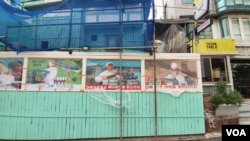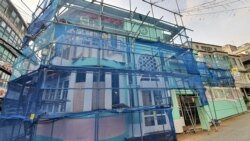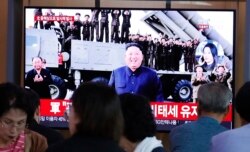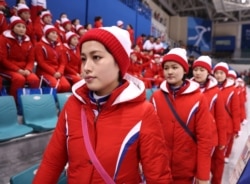VOA's William Gallo contributed to this report.
SEOUL — A plan to open a controversial, North Korea-themed bar in Seoul is highlighting the gray area surrounding South Korea’s National Security Act, which bans glorifying North Korea.
The bar, located in the hip Hongdae neighborhood of South Korea’s capital, aims to be an authentic, North Korean-style pub, complete with “socialist realist” style decorations, including posters that read “More Drinks for Comrades” and “Start a Food Revolution.”
It wouldn’t be the first Seoul restaurant to specialize in North Korean cuisine. But what got this bar in trouble was its attempt to display North Korean flags and portraits of Kim Il Sung, the founding leader of North Korea, and his son, Kim Jong Il.
That may have run afoul of South Korea’s vaguely worded National Security Act, which punishes any actions that incite anti-government activity or praise North Korea, directly or indirectly, with up to seven years in prison.
The controversy underscores the uncertainty surrounding the law, which has been inconsistently applied since its Cold War-era inception and is routinely criticized by rights groups.
Flag, portraits come down
After pictures of the pub went viral on social media, the bar owner quickly removed the North Korean flag and Kim portraits, telling local media he only meant to create publicity and did not intend to praise North Korea.
Local police officials told VOA they are “still reviewing the case,” but have not ordered the bar owner to remove its decorations.
At this point, it isn’t clear when the bar will open. VOA was not able to reach the owner for comment. Construction workers at the building say it may take several weeks to modify the interior design.
Despite the backlash on public media, many people in the neighborhood surrounding the bar seem unconcerned.
“These days, we see Kim Jong Un on TV every day, so I don’t think it is a problem to have it,” said Lee, a Seoul student who only provided his surname.
But the bar owner’s bigger concern may be his legal woes.
History of law
South Korea’s National Security Act, in place since 1948, was meant to safeguard the “security of the state” by regulating any activities compromising its safety.
Since the two Koreas are technically still at war, any favorable comments toward North Korea can be interpreted as a threat to the stability of the South Korean government.
In the past, the law has been used to effectively muzzle pro-democracy voices, labeling them as “pro-North Korea,” said Kwon Oh Hyun, a South Korean lawyer.
“It largely reflects the views of conservatives,” Kwon said. “But North Korea is still the main adversary of South Korea, so that justifies the existence of the act.”
Vague language, inconsistent enforcement
Human rights groups, including Human Rights Watch and Amnesty International, disagree. They have long called on South Korea to scrap or modify the National Security Act.
“The National Security Law criminalizes any dissemination of anything that the government classifies as ‘North Korean propaganda,’” Human Rights Watch said in its 2019 report on South Korea. “The law imposes severe criminal penalties on anyone who joins, praises, or induces others to join an ‘anti-government organization,’ a term not clearly defined in law.”
The law used to be applied much more frequently. In 1999, 312 people were charged under the law, whereas in 2018, only four people were charged.
A few examples:
In 2012, a Seoul photographer was indicted for retweeting messages from an official North Korean account that included praises of Kim Jong Il. He was acquitted in 2014 by South Korea’s Supreme Court, which found the retweets “did not pose tangible threats to national security.”
In 2017, a left-wing activist and owner of an online bookshop was indicted for distributing materials that “benefit anti-government organizations.” The books could be easily found in public libraries and bookstores. The owner was later found not guilty in a 2018 appeal.
During the 2018 Winter Olympics held in the South Korean city of Pyeongchang, South Koreans were not allowed to wave the North Korean flag and some international fans were also reportedly restricted from bringing it into stadiums.
But recently there appears to be more flexibility on the law, amid South Korea’s attempts to improve relations with the North.
In 2018, nine North Korean movies were screened at an international film festival on the outskirts of Seoul. Until that point, South Korean authorities had allowed only a limited number of North Korean movies to be shown to permitted academic groups.
As South Korea’s power surpassed that of the North, simply distributing or showcasing films is no longer viewed as a major threat, explained Lee Pil Woo, another South Korean lawyer.
“The act has been narrowed down for explicit activities that threaten national security deliberately,” he added.
Public opinion
Although the law was revised in 1991, there have been increasing calls for it to be further reformed.
Thirty-six percent of South Koreans say the act should be abolished, and another 32% think its controversial articles should be amended, according to a 2018 poll by R & Search, a South Korean polling company.
“How you can define incitement or an encouraging act? It fails to meet the corpus delicti rule,” which requires a clear definition of the occurrence of a criminal act, said Kim Seon Taek, a professor of constitutional law at Korea University.
That vagueness can create awkward situations, such as in the case of the pub. The central question: Are North Korea decorations a crime, even if they are meant to be ironic or garner publicity? It seems no one really knows for sure; it must be determined on a case-by-case basis.
“The intention of the actor will determine whether there is punishment — in this case, whether he deliberately praised (North Korea) with the portrait,” Kim said. “This is because the amendment of the law in 1991 stipulates that punishment can only be handed out if a person intentionally meant to praise North Korea.”
“But how can you ascertain what a person’s purpose was for any given behavior?” Kim asked.
Past liberal South Korean presidents, from Kim Dae Jung to Roh Moo Hyun, have tried to change the law, but their efforts have failed because of a harsh backlash from conservatives.
Newly appointed Justice Minister Cho Kuk said recently during his nominee hearing that the relevant article of the law “should be abolished, and consolidate to criminal law.”
Kim, the law professor, agreed.
“South Korea can control espionage with its criminal law,” he said. “There is no need for the act now.”







